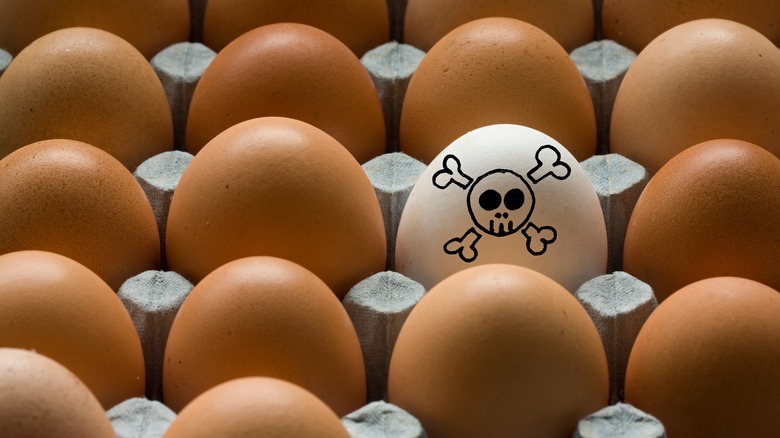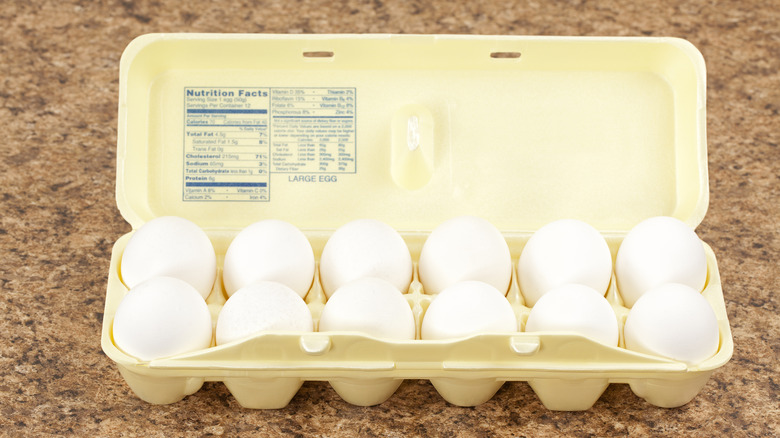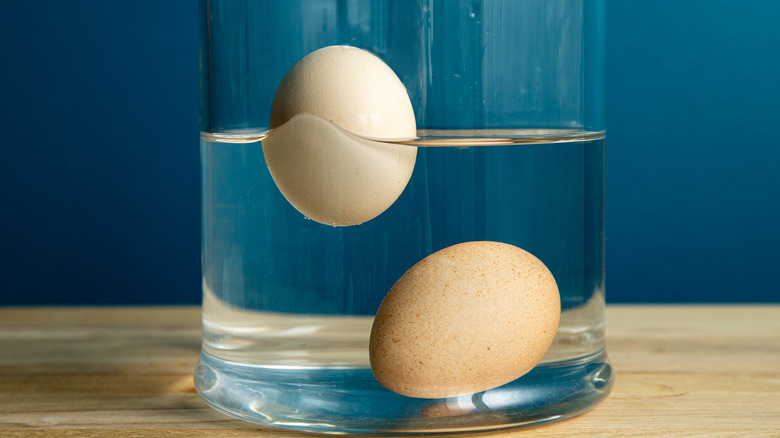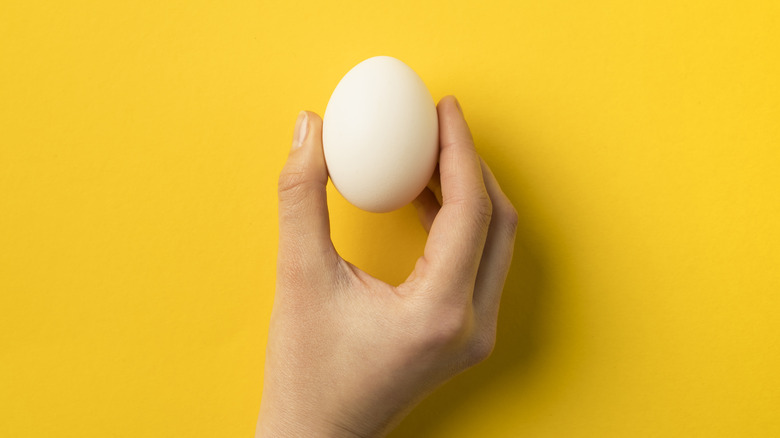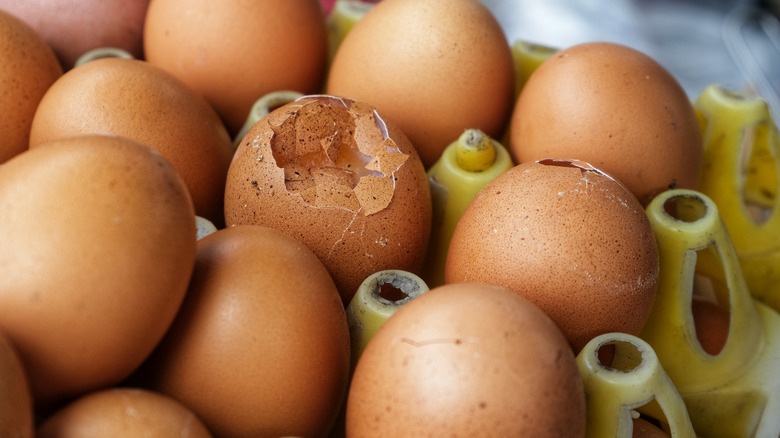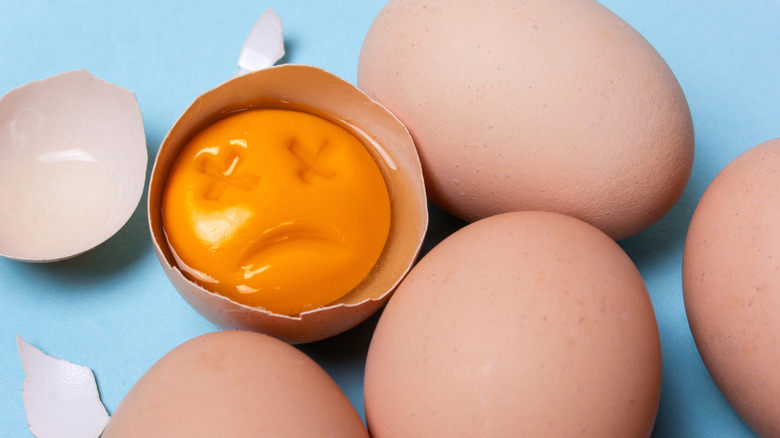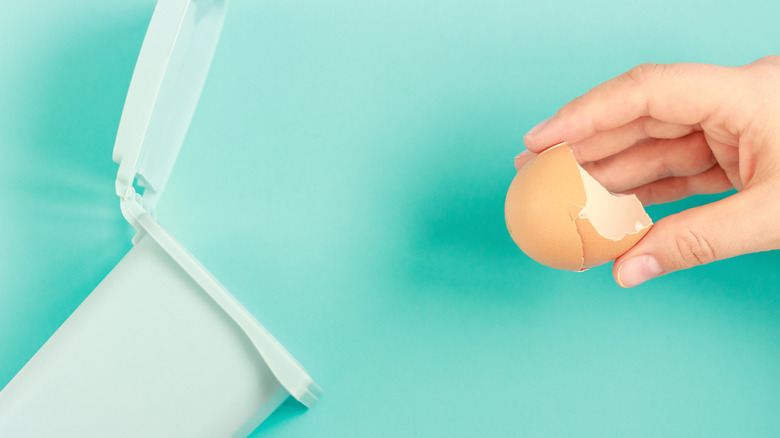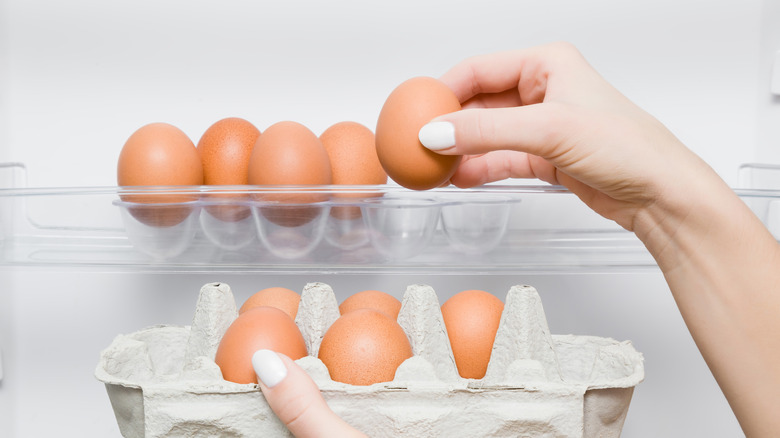8 Ways To Know If An Egg Is Spoiled
Typically, when you crack open a rotten egg, it is accompanied by a pungent smell that immediately alerts you to the fact that it is spoiled. But what if you want to hard boil a questionable egg or avoid being bombarded by the offensive smell? Are there other ways to tell if an egg is spoiled? Fortunately, the answer is yes. From imperfections on the shell to the way they sound and smell to whether or not they float, several handy techniques tell you if an egg is rotten. Let's find out what the options are so you can rest assured your eggs are good to eat.
To determine what the options are for assessing whether or not an egg is spoiled I scoured the internet for useful hacks and tried-and-true methods. I considered chef recommendations, food blogger tricks, scientific research regarding reliability, and more. Keep reading to learn all the different ways to know if an egg is spoiled so you never make a fatal recipe mistake and use one past its usable shelf-life. You may think you know everything you need to know about eggs, but some of the methods I uncovered just may surprise you.
Check the carton for the packaging date
Like many foods, eggs come with handy sell-by, expiration, and packaging dates printed right on the carton. So, if you're wondering whether your eggs are spoiled, checking these dates is a fantastic place to start.
It is not uncommon to think that once an expiration date on any food has passed, it should immediately be thrown in the trash, but as it turns out, they are more of a guideline. They are not a hard line that shouldn't be passed. While many people still believe the myth about egg carton dates, and that they need to be tossed once the expiration date has lapsed, that simply isn't the case. In fact, when handled correctly, eggs can last up to five weeks past the printed expiration date.
Considering the inaccuracy of expiration dates, particularly with eggs, checking for a packaging date (not the expiration date) is often a better indicator of your egg's freshness. Instead of being an estimate, it denotes when the eggs were actually packaged. As a result, you get a concrete answer regarding how fresh your eggs are. When refrigerated, fresh eggs could last for three months or more. If your eggs fall within this timeframe, they could still be safe to eat, even if the expiration date is long passed. Still, it's best to follow up your examination with the following steps to ensure quality and freshness.
See if the egg floats -- If it does it's most likely spoiled
After checking the dates on an egg carton, the next step is to conduct a float test. All this entails is putting your egg (or eggs) in a bowl or glass filled with water and seeing whether it floats or sinks. As the theory goes, if an egg floats in water, it is bad. If it sinks, it is fresh. However, this method isn't necessarily accurate, at least not all of the time.
According to The U.S. Department of Agriculture, if an egg floats it is an indicator that it is not fresh, but it doesn't necessarily mean that it is bad. The only sure thing is that the air cell inside has become large enough to support buoyancy. So, while the egg test seems to be quite popular, there is actually no scientific evidence to back it up. Instead, consider it more of an indicator, not a concrete determination of your egg's status.
For most egg dishes, you have to crack an egg before cooking it, so it's okay if this hack isn't 100% reliable. Still, this technique is fantastic if you want to make hard-boiled eggs because it gives you a good idea of whether or not it is spoiled without cracking it open first. Even so, you should back this test up with the next three techniques as well, and, no, they don't require cracking the egg, either.
Shake the egg -- If you don't hear anything it's probably okay
Even if your egg passes the float test, further investigation is best. Next up on your checklist of ways to determine if an egg is spoiled is the shake test. Unfortunately, this technique is not a surefire indicator, either. Still, the more information you gather the better.
To conduct the shake test, simply hold the egg in question next to your ear and give it a good shake. It doesn't need to be vigorous, just a gentle shake will do. If you can't hear anything and all you get is silence, chances are good the egg is fresh and good to use. However, if you can hear the yolk and egg whites moving around inside the shell, it's a sign it might be bad. As an egg ages, the inside starts to break down, causing a noticeable sloshing noise when you shake it. This test isn't the end all be all of determining an egg's status, so you'll still want to proceed with the upcoming steps to ensure 100% certainty.
Inspect the shell for abnormalities
Checking an egg's shell for abnormalities is the next step to evaluating its potential freshness. When examining an egg, look for any cracks or changes in texture. Ideally, an eggshell is smooth and dry. If the shell is slimy or cracked, it has likely gone bad.
When eggshells crack, it gives harmful bacteria a chance to enter and contaminate the yolk and egg white, notes The FDA. A slimy shell can also indicate potential bacterial contamination. If you encounter either of these attributes while inspecting your eggs, it's best to toss them out. The exception to this rule is if you know cracks in an eggshell are recent, like if you handled the eggs roughly during transport from the store or in your own home. In this scenario, cracks in an eggshell aren't necessarily that serious. Still, if you're concerned about freshness or aren't exactly sure when the cracks developed, relying on the other techniques described in this article will help point you in the right direction and dispel any uncertainty.
Sniff the egg to see if it smells off
Even if you don't see any imperfections on an egg's shell, hear anything when you shake it, or see it float, there's still a chance it is spoiled. The next step to determining if a questionable egg is good or not involves sniffing the shell. Typically, good eggs won't smell like much at all. However, if they are rotten, you'll likely get a whiff of something awful and some would say, downright offensive. Some equate the smell to sulfur, but really, a rotten egg is in a class of unpleasant odors all its own.
The smell of a rotten egg is something almost anyone can identify, even if they don't have any specific memories of encountering the odor. In fact, the aroma is so recognizable that gas companies add the smell to natural gas to alert people of a potentially hazardous leak. With this in mind, you shouldn't have any trouble recognizing if your eggs smell off. If you have even the slightest suspicion, you should trust your instincts and toss the offending egg in the trash.
Crack the egg open and take a closer look
The final, most accurate way to determine whether or not an egg is spoiled is to crack it open and evaluate the actual yolk and white. Often, if an egg is bad, it will become apparent the moment you open the shell, either due to a pungent smell or changes in color. To ensure you don't accidentally ruin a recipe, don't crack a questionable egg straight into other ingredients. Instead, crack and empty it into a separate bowl or glass.
Once cracked, if an egg smells like sulfur or has an unpleasant aroma, it's safe to say the egg has gone bad. Discolorations in the yolk and white are also indicators that an egg is no good. However, not all abnormalities in appearance and color are signs an egg is spoiled. For example, the yolk itself could vary in color based on the diet of the hen that laid it. Additionally, a cloudy egg white is a sign that it is fresh. Finally, a red blood spot may be somewhat off-putting, but it's typically nothing to worry about. Abnormalities to be wary of include a green or iridescent egg white and black or green spots in the egg. These changes are signs of bacterial contamination. If you notice any of them, your egg is not safe to eat.
If the egg fails any of the tests, toss it out
Once you know for sure that an egg or carton of eggs is spoiled, don't hesitate to throw them in the trash. While both good and spoiled eggs have the potential to carry salmonella, bad eggs have even more bacteria. Spoiled eggs could also host E.Coli, which causes illness accompanied by fever, vomiting, diarrhea, and stomach cramps and pains.
The U.S. Food & Drug Administration reports that illness occurs anywhere from 20 minutes up to six weeks after consuming food-borne bacteria associated with eggs. The FDA also notes that while most people recover quickly, some people aren't so lucky. Chronic or life-threatening health problems could develop. They even go so far as to say you should immediately contact your healthcare provider if you suspect you have contracted a food-borne illness. This may sound a bit scary, but thankfully, we now know all the ways to determine whether or not an egg is bad. As a result, the chances of this happening are pretty low.
So, even if an egg is questionable, don't risk it. Throw it away immediately. Preventing a small amount of food waste is not worth the potential adverse side effects caused by consuming spoiled eggs.
How to store eggs the right way
Storing your eggs properly helps ensure they have the longest usable lifespan (up to five weeks when done right). Many refrigerators have a nifty built-in storage area in the door with little egg-sized cups. As a result, you'd think this is the right place to keep your eggs. However, you may want to avoid this risky mistake. Why, you ask? The answer is simple. Eggs need to be stored in the coldest area of your fridge. While the built-in egg cups in the door of many fridges can be tempting, due to door opening and closing, the temperature in this area fluctuates quite a bit. So, to keep your eggs safe and fresh, it's best to store them in the carton on one of the shelves towards the back.
In addition to utilizing the coldest part of your fridge, storing your eggs upside down promotes long-lasting freshness. This may seem odd, but it has to do with an air pocket near the bottom of an egg. When stored upside down, the air pocket is less likely to rupture the shell, leading to longer usability. When you bring home a fresh carton of eggs, turn it upside down and place it in the fridge. If you think you might forget and pick the carton up without slowly flipping it back over (to avoid a mess), you can turn each egg upside down in the carton. That way, you won't accidentally spill and break them.

